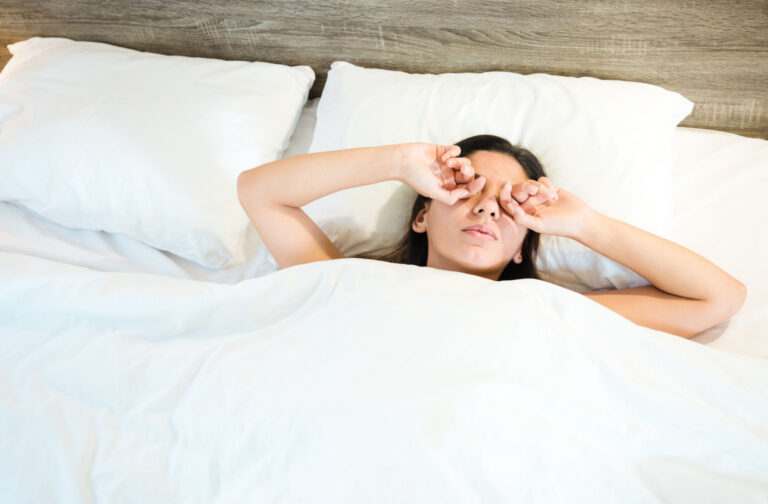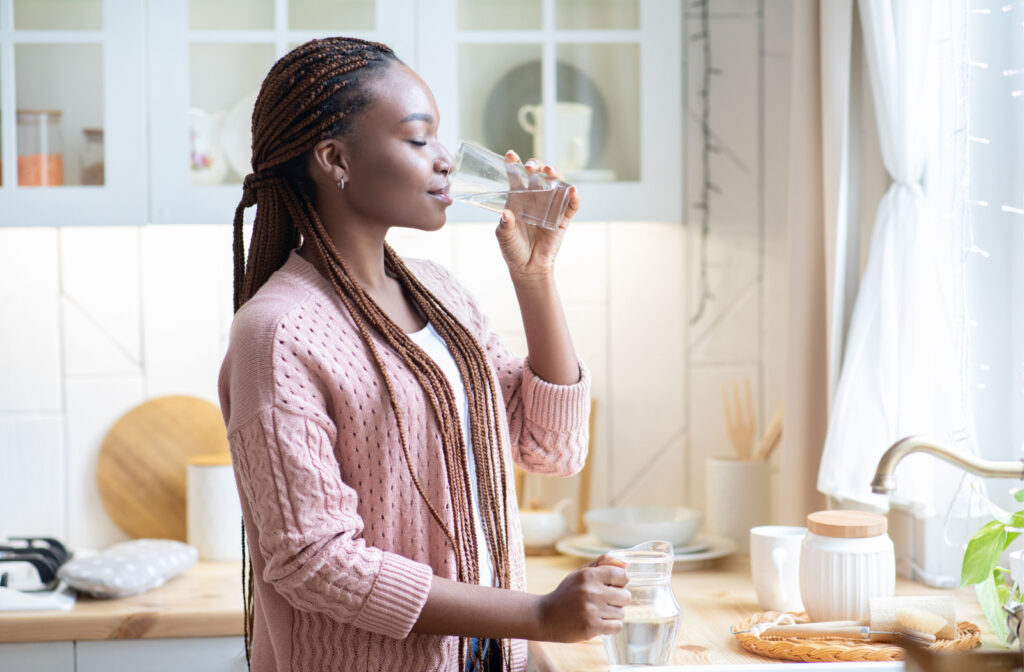Table of Contents

Introduction
No one enjoys experiencing dry eyes, especially when they wake up. This dryness can occur for several reasons, making them difficult to manage alone. However, your eye doctor is here to help treat dry eyes.
There are many ways to help prevent dry eyes while sleeping, from at-home remedies like drinking more water to optometrist-recommend treatments like hydrating ointments. Your eye doctor can help recommend a customized treatment plan after identifying the cause of your symptoms. Dry eyes can be irritating, but they’re manageable with the right treatment.
What Are Dry Eyes?
Dry eye occurs when your tears cannot effectively hydrate your eyes, leading to discomfort. Many patients assume dry eye is insignificant, but it can be a chronic issue. This condition can affect your quality of life, making it difficult to focus at work or on other tasks.
Dry eyes can lead to several uncomfortable symptoms, including:
- Red, irritated eyes
- A stinging or burning sensation in your eyes
- Blurry vision
- Watery eyes
- Gritty eyes
Many factors can contribute to dry eye, but this condition occurs due to issues with your tear film. Your tear film consists of 3 layers (mucus, water, and oil) that help keep your eyes moist and protected. When one or more layers experience issues, it leads to dry eyes.
What Causes Dry Eyes When You Sleep?
Dry eyes can occur when you sleep for several reasons. Your symptoms may occur due to common causes like decreased tear production or nocturnal lagophthalmos:
- Decreased tear production: Decreased tear production occurs when issues arise in the glands that create your tears. Age is the most common cause of fewer tears, but medications and medical conditions can be additional factors.
- Increased tear evaporation: Increased tear evaporation occurs when issues arise in the tear film, typically with the meibomian glands—which supply oil to your tear film. When there isn’t enough oil in the tear film, tears dry out quicker, leading to dry eyes.
- Nocturnal lagophthalmos: Nocturnal lagophthalmos causes the inability to close your eyelids at night, which can lead to dryness. This condition typically develops due to a weakness in your facial nerves, whether from injury or Bell’s palsy.

How to Prevent Dry Eyes While Sleeping
While dry eyes are uncomfortable, they aren’t a permanent condition. You can help relieve your symptoms in many ways. Some patients can manage dry eyes at home through several strategies.
Some at-home changes you can make to relieve dry eyes include:
- Staying hydrated: Ensure you drink enough water to stay hydrated—dehydration can affect tear production.
- Reduce screen time before bed: Digital screens like your phone or laptop can reduce the amount you blink, leading to dry eyes. Take a break from your screens before you sleep to let your eyes rest.
- Protect your eyes against the environment: Wind and dry air can dry out your eyes, so protect them when you’re outside. Wear wraparound sunglasses so your eyes are covered.
- Invest in a humidifier: A dry environment can factor into dry eyes. Running a humidifier at night can help you wake up feeling refreshed.
- Take your contacts out: Contact lenses can worsen dry eye symptoms, so try removing them earlier before you sleep. Wear glasses instead to reduce your dry eye symptoms.
- Get the right vitamins and minerals: Vitamins and minerals like omega-3 fatty acids, vitamin D, and vitamin A can benefit your eye health. Ensure you speak with your eye doctor before you begin taking supplements.
Visit Your Eye Doctor
Natural remedies aren’t always the solution when you have dry eyes. In cases of significant dry eye, your optometrist may suggest a treatment plan to help restore function to your tear film. Depending on the cause of your symptoms, there are many treatments available.
Your eye doctor can recommend treatments for dry eyes, including:
- Ointments: Ointments are thicker than regular eye drops to help provide moisture for longer. You place a small amount of ointment on your eyes before you sleep to wake up with hydrated eyes.
- Prescription medications: Prescription medication can help relieve dry eyes. These medications have different purposes, from improving tear production to reducing inflammation.
- Artificial tears: Artificial tears simulate real tears to provide temporary moisture to your eyes. You can buy artificial tears over the counter, or your eye doctor can provide you with drops they recommend.
- Punctal plugs: Punctal plugs are medical devices that can help reduce dry eye symptoms. Your optometrist places tiny plugs in your tear ducts to slow tear drainage, helping your eyes stay hydrated for longer.
Wake Up With Comfortable Vision
Don’t endure the discomfort of waking up with dry eyes every morning. Explore various at-home treatments, or consult your eye doctor for a personalized treatment plan to address the root cause of your symptoms.
Contact us at Golden Vision Optometry if you’re experiencing dry eye symptoms or waking up with dry eyes. Your comfort is our priority.








